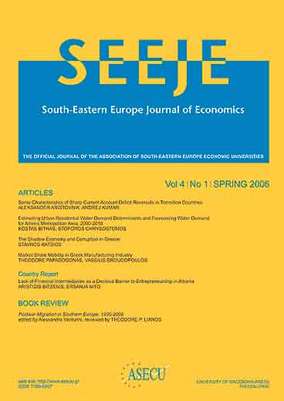Impact of initial conditions on transition progress : the case of Montenegro
Part of : SEEJE ; Vol.8, No.2, 2010, pages 153-169
Issue:
Pages:
153-169
Author:
Abstract:
Shortly after the transition started an important debate was initiated over the length of the process and on the factors that influence advancement of a country in transition reforms. It appeared that transition progress has to be understood as an endogenous phenomenon that is affected by the initial conditions of the country in question. Moreover, economic performance also depends on inherited conditions as well as on the transition progress of a country while the latter should be also regarded as endogenous in itself. From this standpoint the case of the Montenegrin economy is analysed, since Montenegro is among transition laggards, predominantly because of a substantially delayed start of reforms. Firstly, broader assessments on transition progress are presented, mostly based on the EBRD indicators. Since the actual success of reforms conducted as well as their speed and pace of implementation, cannot be estimated correctly unless inherited conditions are taken into consideration, several models have been specified and estimated that could show how and to what extent initial conditions affect the transition progress of transition economies. The results obtained for the entire set of transition countries are subsequently applied to the case of Montenegro. The results lead to a conclusion that reforms in the country proceeded at a faster pace after the 1999 but were primarily directed to privatisation and liberalisation issues while institution building is slightly delayed and stays below an accessible level regarding initial and inherited conditions in Montenegro.
Subject:
Subject (LC):
Keywords:
transition, transition progress, initial conditions, institutional development, Montenegrin economy, comparative analysis
Notes:
Περιέχει γραφήματα, πίνακες, σημειώσεις και βιβλιογραφία, An earlier version of this paper was presented during the 6th International Conference of ASECU, held in Podgorica, May 20-22, 2010. The author is grateful to the participants for useful comments., JEL Classification: C52, P27, P30, P52




